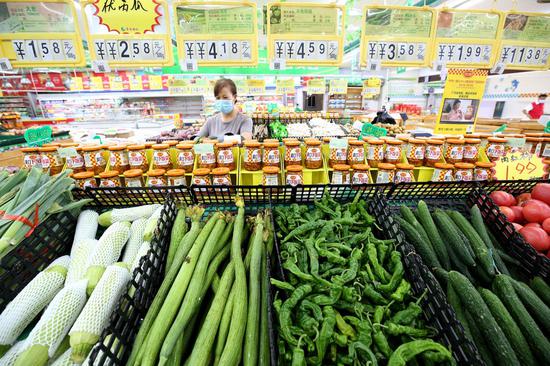China's consumer prices see modest rise in November
China's consumer prices saw a modest growth in November compared to a year earlier, while the economy has sustained the recovery momentum driven by the government's barrage of support policies since September.
According to data released by the National Bureau of Statistics (NBS) on Monday, China's consumer price index (CPI), a main gauge of inflation, increased by 0.2 percent year-on-year in November, slightly lower than the 0.3 percent rise registered in October.
"This is largely due to a deceleration in food price rises," said NBS chief statistician Dong Lijuan.
The core CPI, which excludes food and energy prices, rose 0.3 percent from a year ago in November, up from 0.2 percent in October, Dong said.
The NBS data also showed the country's producer price index (PPI), which measures costs for raw material supplies at the factory gate, dropped by 2.5 percent year-on-year in November, narrowing from the 2.9 percent decline seen in October.
On a month-on-month basis, the PPI rose by 0.1 percent in November, following a drop of 0.1 percent in October.
Wan Zhe, an economist and a professor at the Belt and Road School of Beijing Normal University, attributed the increases in core CPI and PPI in November to the sustained economic growth since September, thanks to the government's pro-growth policies rolled out since September to boost high-quality economic development.
In order to promote significant improvements in macroeconomic indicators, more supportive policies are expected in 2025 to ramp up domestic consumption, elevate market expectations, and strengthen internal economic growth momentum, Wan told the Global Times on Monday.
Zhou Maohua, an economist at China Everbright Bank, told the Global Times on Monday that fluctuation in consumer prices in a single month will not affect the overall recovering trend in consumer prices, as domestic consumption and demand are expected to revive in the coming months.
"China has ample fiscal policy room. Policies such as supporting large-scale equipment upgrade and spurring trade-in for big-ticket consumer goods with more robust measures, beefing up infrastructure projects, and shoring up the stabilization of the property market are expected to spur higher consumer spending and investment activity," Zhou said.

